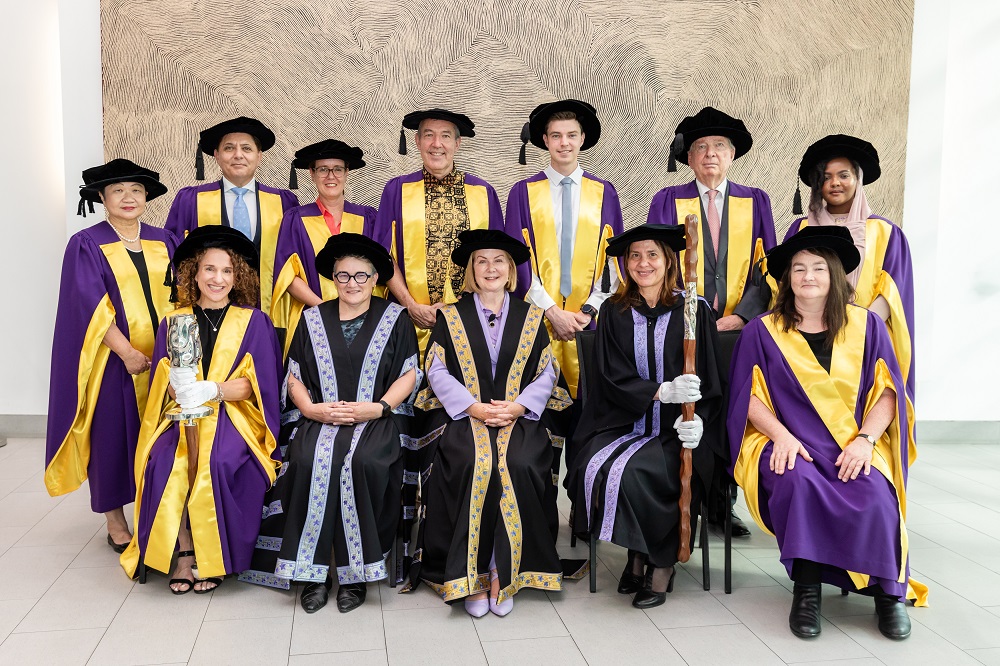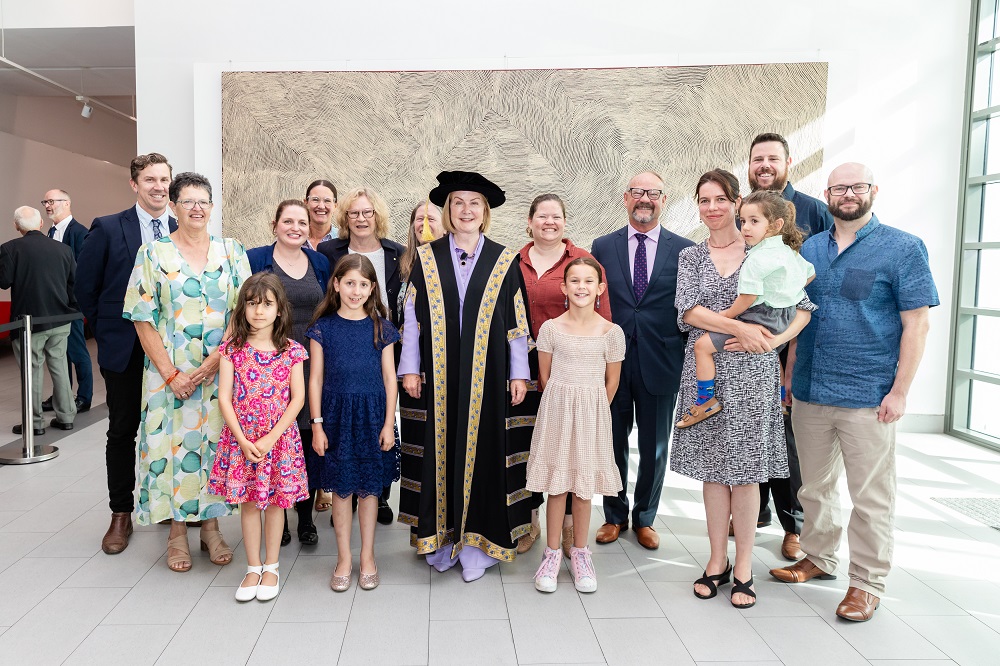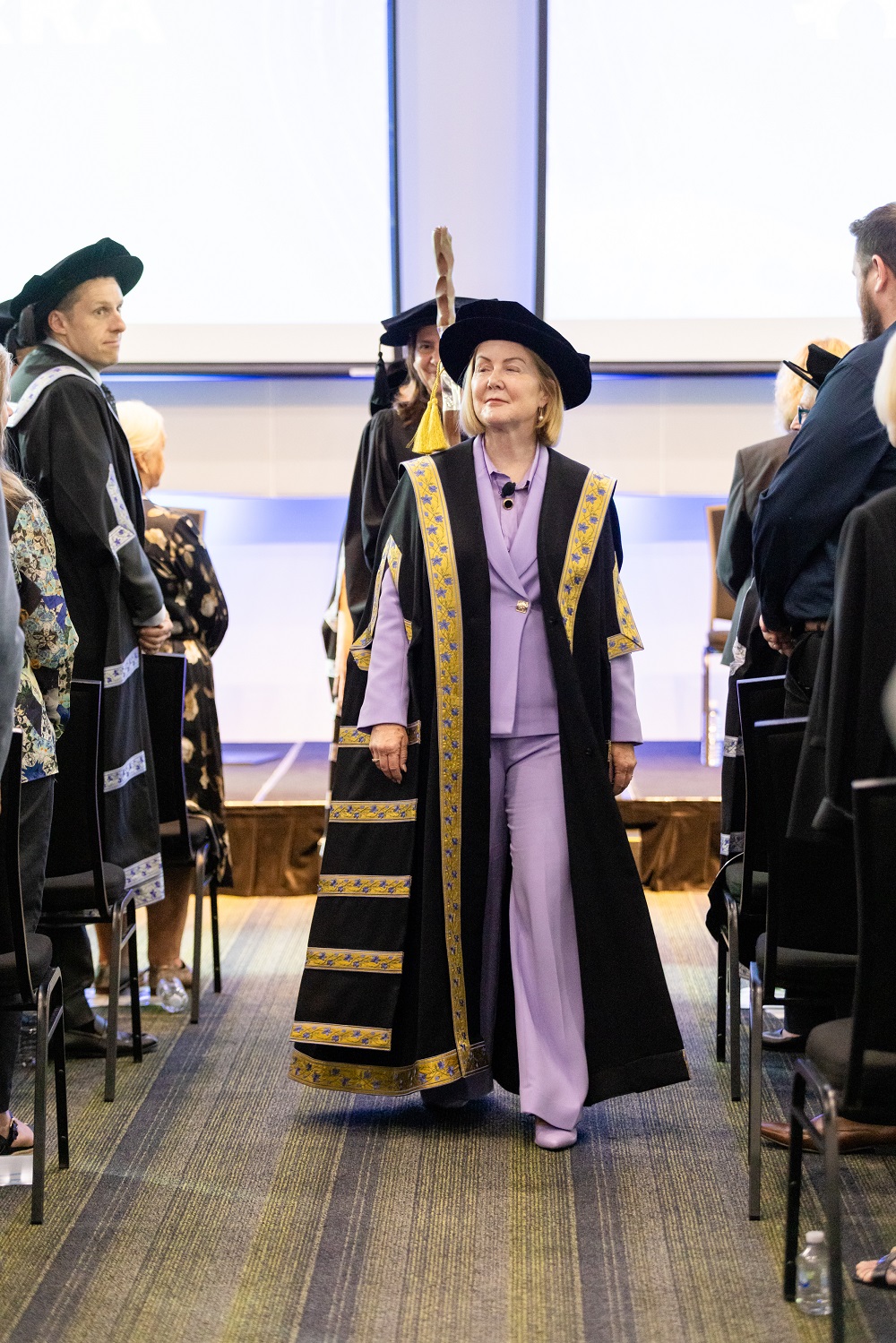Community Connections
”My heartland is social justice”: UC’s new Chancellor, Lisa Paul AO PSM
With the first day of 2024 marking the start of her tenure as Chancellor, Lisa Paul AO PSM began the year with a whirl of activity – but found herself focusing on one thing above all others: listening.
“I love hearing people’s stories, about where they come from, what they care about … what they worry about, and what the University can do to help them,” she says.
So whether it’s a sit-down with an Executive Dean, or chatting to students at the various stalls at UC's O-Week (“that was so amazing, to be able to just go up to students and have a chat!”), Lisa asks: “What can I do for you?”
“My heartland is social justice. I strongly believe in equity and access for all, and I have a passion for helping people to be the best they can be,” she says.
“I think it’s important that people are treated well, and are involved in the decisions that affect them.”
These are the pillars she has built her life and work on – and which will underpin her time as Chancellor.

“I’m exploring the role UC’s Council can play in expanding a university-wide culture within which people are cared for – and know it – and in keeping a finger on the pulse of that culture,” Lisa says.
“Culture can be changed, but it’s better to start with a good one – and I think UC has a great culture!”
Lisa’s decades-long career as a senior public servant – which includes her time as Australia’s longest-serving Secretary of the Department of Education of Australia – have seen her place great importance on taking the cultural temperature, and making changes when needed.
While Lisa faced the unexpected hurdle of Vice-Chancellor Paddy Nixon’s time at UC ending just as hers began, she took it in her stride and has found a warm and positive synergy with Interim Vice-Chancellor Professor Lucy Johnston – “We just work really well together, as it turns out!”
A life of service
Lisa was born in California, in the United States. Her parents were both teachers, and they moved their young family first to Christchurch in New Zealand, and then to Adelaide in South Australia. In Australia, Lisa’s mother would end up becoming a TAFE Librarian, while her father was a Dean of Education at one of the founding institutes of the University of South Australia.
Just seven when she arrived in Australia, Lisa has considered herself a proud Australian ever since.
With parents who were passionate educators, Lisa always considered university as a natural step, moving to Canberra to complete a Bachelor of Arts at the Australian National University. “Of course, UC wasn’t yet a university at the time,” she says, with a wink.
After graduation, Lisa started building her decades-long career in the public service, her first role with the Australian Capital Territory’s Government Housing Trust. She went on to work in portfolios including childcare, employment, and of course, the many faces of education – vocational, apprenticeships, higher education and research.
When the 2002 Bali bombings shook the nation, Lisa was a Deputy Secretary in the Department of Family and Community Services, and led the Commonwealth’s domestic response to the attack. For this, she received a Public Service Medal in 2003; this was followed with an Officer of the Order of Australia award in 2011, the same year that she was named Federal Government Leader of the Year in the Institute of Chartered Accountants Awards.
In 2004, Lisa was appointed the Secretary of the Department of Education, Science and Training, just the third woman to become a departmental secretary. When the Department split into two separate entities in 2013, she became the Secretary of the Department of Education.
In addition to holding the title of longest-serving in the role, Lisa was also the first departmental secretary to be an out-and-proud member of the LBGTIQ+ community – and heard numerous times how her visibility as part of the queer community made it easier for others in the sector.
“I’ve been with my partner Linda for over 35 years, and now when I mention her, nobody blinks an eye – but when I first started in my career, people did sometimes show discomfort,” she says.
“My own feelings of safety and comfort around being open about who I am, have certainly increased over the years, with the change in societal attitudes, and the same-sex marriage plebiscite in 2017.”
There’s much work to still be done in that space though, says Lisa. Approximately 30 per cent of clients coming in to headspace – the mental health non-profit for youth which she chaired – are seeking help related to sexuality and gender identity.

When she left the public service in 2016, Lisa continued her vocation of service to community and nation – as headspace Chair, and a Member of the Patron’s Advisory Council for the Raise Foundation, which provides support for teenagers in high school across Australia. She’has also been on the Boards for the Australian Research Alliance for Children and Youth, Social Ventures Australia, Schools Plus and High Resolves.
While that all sound like a 48-hour day, Lisa is intentional about carving out time and space for herself, and guards her mental health and wellbeing fiercely.
“I love bushwalking and yoga, being with my friends and reading – currently, it’s British 1930s detective fiction,” she says.
“I’ve always been into learning new things – mum and dad were educators, after all – so I’ve done some great workshops on welding, woodwork and forging. I forged a fire poker!
“I’ve been a knowledge worker all my life, so it’s really cool to get out there and do things that use heart, brain and hands.”
Education is the key to the door
For Lisa, a strong belief in access to education – and in its value to change lives – ran in her blood. Social justice and a desire to drive equity, drove her in turn.
“Throughout my career, I’ve begun every speech with the fact that ‘Indigenous business is everyone’s business’,” she says. “And I’m looking forward to seeing how that is brought to life across the breadth and depth of UC, how all our work crystallises and makes real and tangible our commitment to Reconciliation and to the Ngunnawal people.”
And in her years in the public service, Lisa witnessed firsthand how policy could bring social justice to tangible life – making it crucial that such policies are evidence-based.
Her belief system and life experiences have formed stepping stones on a path that has led to helming a university.

Universities are fundamental to democracy itself, says Lisa, because they disseminate evidence-backed knowledge – “so if you value democracy, you naturally value universities.”
“I’ve thought for a long time that it’s important to bridge the worlds of academia and policy, university and government – as a university, we rely on the government for funding and policy direction, but the two worlds are very different, with different languages and reward systems … and it will be very valuable to build these bridges, particularly as a civic university in Canberra.”
In all the listening Lisa has done over the past couple of months, gleaming nuggets of information about the research being conducted at UC have shone brightly.
“We have such amazing research being done here – a project to clean the Sydney Harbour Bridge with lasers, for instance! The impact our research has on community, region and nation is what matters to me, and I guess that has a lot to do with my background in policy,” she says.
“In a world driven by opinion and social media – where opinion is often given the same status as fact – it’s never been more important for universities to be generating research-driven knowledge.”
“Education is the key to the door in people’s lives, whether it’s because it helps them learn to think critically, or because a qualification has opened a career door.
“The process of getting a degree is transformative, and at UC, 40 per cent of our students are first in family – that is an amazing number in terms of access to education.”
She’ll be looking to drive that accessibility at UC even further, as the University pursues its goal of becoming Australia’s most accessible university.
“We’re going to work to really bring that to life,” she says. “UC welcomes everyone – we try to remove barriers for people to study and learn no matter where they are from, no matter what their past.”
“There’s a lot of work ahead, and I’m really looking forward to it – it all goes back to my heartland of social justice.”
Words by Suzanne Lazaroo.
Photos by Tyler Cherry.
Video by John Masiello.
Video interview by Emma Larouche.